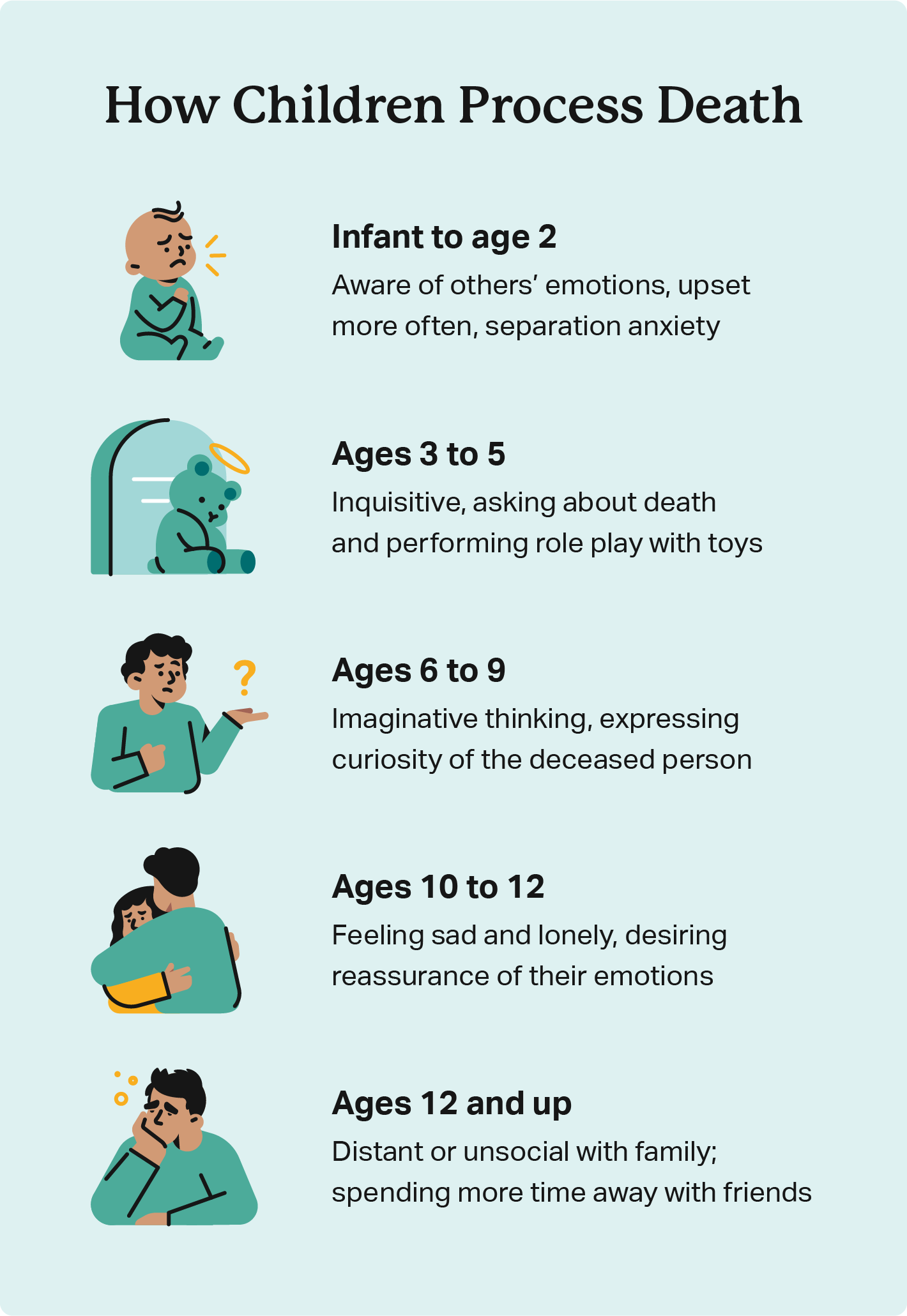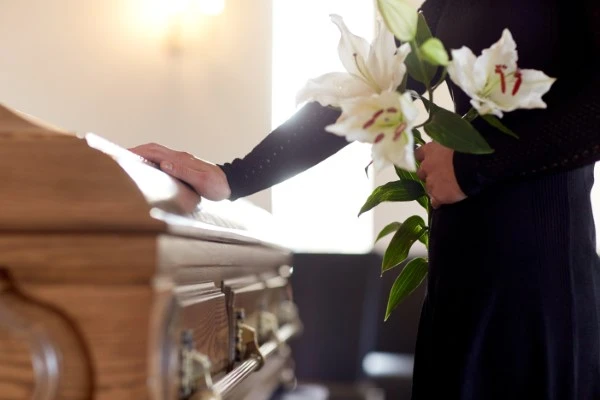While you may naturally want to protect your child from feeling the emotional pain of death, it’s important that you speak honestly and openly with them about the situation. You might have questions about how to explain death to a child, how to begin the conversation, or don’t know what to say.
In this guide, you’ll learn ways to effectively talk with your child about the passing of a loved one, as well as helpful resources for parents on helping kids cope with loss.
Importance of Talking to Kids About Death
Children may not understand that death is permanent. They may ask questions like, “When is grandpa coming back?” Although answers may seem gentler with phrases such as “passed away” or “went to sleep,” it can be confusing. It’s important to answer questions your child has simply and directly, without ambiguity. Even for older children who may understand death, it may still be difficult to process their emotions when losing someone close to them. It’s OK to admit you don’t have all of the answers. Consider asking open-ended questions to help settle a child’s curiosity.
Bereavement Differences By Age Group
Bereavement will look different depending on a child’s developmental stage. Below are signs of grief in children at various ages and the emotions that accompany it.
Babies/toddlers (ages 2 and under)
While children at this age might not have the language to say how and what they are feeling, they can still experience separation and loss. Babies may not completely understand death, but they can pick up on the distressful feelings of parents and those around them.
Preschoolers (ages 3–5)
Children at this age may find it hard to grasp that death is permanent. They’ll need a lot of reassurance at this development stage, where kids may believe that someone will come back to life again or that they made the person die.
Primary-school children (ages 6–9)
School-aged children may still have confusing thoughts about death, such as it being temporary. They may also think the deceased person can still feel things like hunger or cold. They may ask direct questions about where the person is and what happened to them.
Older children (ages 10–12)
By pre-adolescent age, children know that death is not temporary. Since they are more aware of how adults and others are reacting to death, it’s important to talk honestly about events and feelings. Kids need regular reassurance that their grief is understood.
Adolescents (ages 12+)
Teenagers may react like younger children or have reactions akin to those of an adult. They will probably want to spend more time with friends than with family for support. Their feelings may be overwhelming, and although they can appear to be fine, they may be genuinely hurting or suppressing how they feel.
10 Tips For Explaining Death To Children
Children need to know they’re not alone and have someone to talk to when needed. Below are a few healthy ways you can approach them on the subject of death.
1. Be honest and straightforward
Since children may not fully understand the concept of death, it’s essential to be honest and tell them facts in an age-appropriate way. Use direct and clear language that meets where your child is developmentally.
2. Ask open-ended questions
Your child may have questions but be too afraid to ask them. You can start a conversation with them by asking open-ended questions, encouraging the child to share their thoughts and concerns.
3. Explain funerals and what to expect
You can prepare your child for a wake or funeral ceremony by walking them through the ritual or cremation process. Explain what they’ll see, such as the casket or urn, decorations, and grieving guests.
4. Allow them to participate if desired
Your child may want to express their love of the departed at the funeral, such as sharing a drawing, poem, or favorite photos. Providing a role can help children feel connected and cope better.
5. Help your child remember their loved one
Try not to avoid talking about the deceased loved one. Instead, consider sharing stories and happy memories of them with your child.
6. Provide comfort and reassurance
In the days or weeks following the funeral, your child may still be grieving. Talk with them more, asking how they feel and that you’re there for them whenever they need you.
7. Validate your child’s feelings
Most children may still not know how to process their emotions and lack the words to express them. Provide labels to those feelings by sharing your own. In return, it can make it easier for your child to do the same.
8. Create healthy distractions
Encourage children to read books or poetry when they are grieving. Motivate them to exercise, and ensure they continue to eat healthy foods. Help your child to cope by engaging in social activities.
9. Give them time to heal
The most significant thing children can do to deal with death is to be patient with themselves and allow themselves to feel the emotions related to the loss. Consider telling their school and teachers about the death, as your child may also need time away from school to heal.
10. Consider therapy
Death, especially when it’s sudden and shocking, can be extremely difficult to cope with. In this case, seeking a therapist or professional grief counselor may be best.
Frequently Asked Questions
It’s normal for children around age three to become curious about death and ask questions. At this age, you can use simple terms and examples to explain death, such as through playing with toys and age-appropriate books.
While using the words “died” and “dead” with children can seem harsh, they provide concrete explanations and can help kids better process. It’s recommended not to use euphemisms such as “went to sleep” or “passed away,” as they may confuse a child.
Attending funerals and wakes is a personal choice, including for children. If your child is comfortable with going and desires to do so, you can support them by explaining the funeral process and what to expect. The funeral may be a helpful way for the child to say goodbye and grieve.
Additional Resources
Having support from parents and other family members and being able to talk to them can be very helpful. You may want to seek counseling for your child to help them deal with their emotions and the loss. Below are some helpful resources to help kids cope:
- Helping Your Child Deal With Grief
- Grief on Sesame Street: Helping Children Understand and Mourn
- The Do’s and Don’ts of Talking With a Child About Death
- Seven Suggestions for Explaining Death to Children
- 64 Children’s Books About Death and Grief
- A Child’s Concept of Death
Handling Final Arrangements
While death can be an emotional toll on children and adults alike, funeral arrangements don’t have to be. Final expense insurance can cover burial, medical and unforeseen expenses after your or a loved one’s departure. Find a burial insurance policy today to help relieve any financial burdens of planning.
Sources:
Choice Mutual often cites third-party websites to provide context and verification for specific claims made in our work. We only link to authoritative websites that are known to provide accurate information. You can learn more about our editorial standards, which guides our mission of delivering factual and impartial content.
- Helping Your Child Deal With Grief. https://kidshealth.org/en/parents/death.html
- Grief on Sesame Street: Helping Children Understand and Mourn. https://sesamestreetformilitaryfamilies.org/topic/grief/?ytid=a2VpflpbOmk
- The Do's and Don'ts of Talking With a Child About Death. https://www.psychologytoday.com/us/blog/two-takes-depression/201612/the-dos-and-donts-talking-child-about-death
- Seven Suggestions for Explaining Death to Children. https://elunanetwork.org/resources/seven-suggestions-for-explaining-death-to-children/
- 64 Children's Books About Death and Grief. https://whatsyourgrief.com/childrens-books-about-death/?forcedownload=true
- A Child's Concept of Death. https://www.urmc.rochester.edu/encyclopedia/content.aspx?ContentTypeID=90&ContentID=P03044
- Child Development Institute. https://childdevelopmentinfo.com/
- LeBonheur Children’s Hospital. https://www.lebonheur.org/blogs/practical-parenting/saying-the-d-word-tips-for-explaining-death-to-your-child
- Child Mind Institute. https://childmind.org/article/should-children-attend-funerals/




